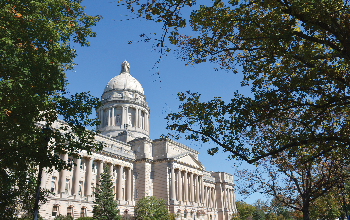2020 Legislative Preview

Legislators will face tough choices during budget session
Kentucky School Advocate
January 2020
By Brenna R. Kelly
Staff writer
Kentucky may have a new governor, but the one constant in Frankfort every January is the start of the legislative session. When the General Assembly convenes Jan. 7, its main task will be to pass a budget to fund the state for the next two years. And that includes allocating money to the state’s system of common schools – just how much money is the question.
 “Above all KSBA’s focus is going to be on the budget bill and obtaining a truly adequate amount of state support for preschool through 12th-grade education delivered through our member school districts,” said Eric Kennedy (pictured), KSBA’s director of advocacy.
“Above all KSBA’s focus is going to be on the budget bill and obtaining a truly adequate amount of state support for preschool through 12th-grade education delivered through our member school districts,” said Eric Kennedy (pictured), KSBA’s director of advocacy.
In addition to increased funding to the SEEK allocation formula, KSBA is also asking the legislature to fund Senate Bill 1 (2019), the School Safety and Resiliency Act, allow equalization of nickel taxes and make the required contribution to the Teacher’s Retirement System.
Education won’t be the only state services seeking more money from a very limited pot of revenue. Pensions, corrections, social services and transportation needs will all be vying for funding.
“Everyone realizes it will be an extremely difficult budget with extremely constrained state revenues,” Kennedy said.
Just days before he left office, former Gov. Matt Bevin issued a dire warning that the state could face a $1.1 billion shortfall over the next two fiscal years. The memo cited increased costs for Medicaid, corrections and pension and only a small growth in state revenue to pay for it.
Jason Bailey, Kentucky Center for Economic Policy executive director, said the shortfall in revenue is due to tax changes the legislature passed in 2018 and 2019.
“While a few interests received a windfall, all Kentuckians will lose as the resources to support the budget become increasingly sparse,” Bailey said in a recent column.
Because of the limited revenue, legislators will face tough choices during the long 60-day session, Kennedy said.
“It will take all of our advocacy, every school board member, every superintendent, KSBA, our parents, our teachers, everyone who is concerned about education to strongly advocate for our legislators to prioritize the most important functions of government – preschool through 12th-grade education in our common schools,” Kennedy said.
Will the Republican-controlled legislature, in the face of a massive shortfall, be willing to find a way to bring in more money to the state’s coffers?
“That’s the $1 billion question,” Kennedy said. “Because of the predictions, are legislators who might otherwise be against revenue increases, will they be more willing to support some form of revenue increase?”
If so, those options could include increasing an existing tax, creating a new tax or eliminating some tax exemptions. A bipartisan legislative tax force two years ago studied the state’s tax exemptions and recommended that most be repealed, however no action was taken.
“But perhaps in the face of a $1 billion shortfall, some of them might be repealed or reduced,” Kennedy said.
At the very least, the lack of revenue should be enough to convince the legislature to not create new tax exemptions such as scholarship tax credits, he said. Supporters of the tax credits, which allow deductions for donations to scholarship granting organizations, are expected to try again this session after a tax credit bill died in committee during the 2019 session.
The budget process will begin sometime between Jan. 7 and Jan. 20 when Gov. Andy Beshear lays out his budget proposal in the State of the Commonwealth address. The address will be carried live on KET.
“We encourage all of our members to tune in that evening once the date is announced,” Kennedy said.
Other KSBA legislative priorities:
While adequate funding for schools and districts will be KSBA’s main priority, other goals include helping students, school governance and pensions.
• Helping schools better serve the 9,000 Kentucky children in foster care. This bill would allow social workers to share more information with students’ schools and teachers in order to foster more direct partnership and collaboration between foster parents, social workers and teachers.
• Balancing school-based decision making (SBDM) council and school board authority.
• Improving CERS governance & accountability to members, employers and taxpayers.
• Adopting tax reforms to increase general fund revenues and diversify local taxes.
View KSBA’s 2020 legislative priorities in their entirity